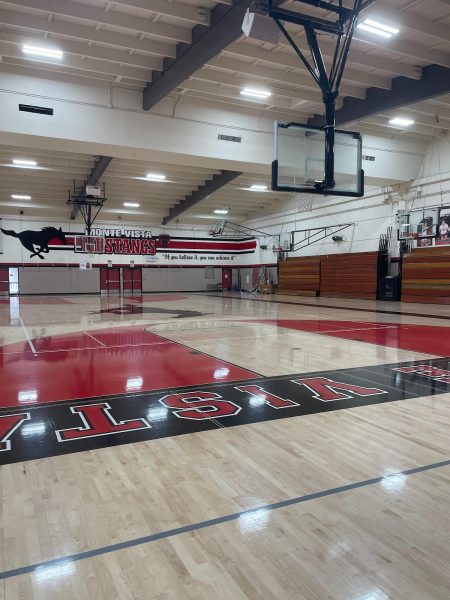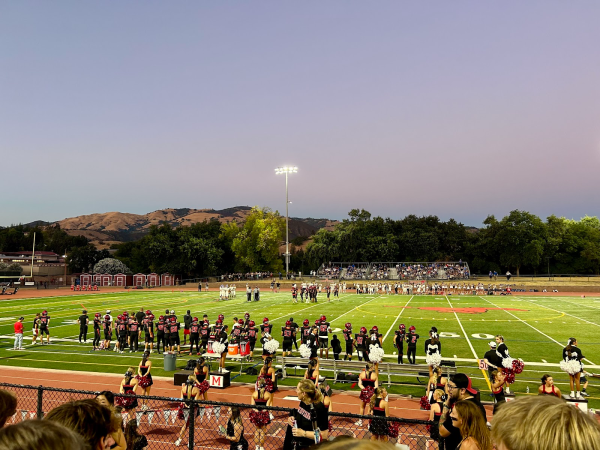The Third Team: How Referees Change the Game

Chiefs wide receiver Juju Smith-Schuster runs a route against Eagles cornerback James Bradberry in the late minutes of Super Bowl LVII. A controversial holding penalty was called on this play that allowed the Chiefs to secure the win.
It’s late in the fourth quarter of Super Bowl LVII between the Philadelphia Eagles and the Kansas City Chiefs. With the game tied at 35 points, the Chiefs are driving down the field looking to score and secure the coveted National Football League (NFL) championship.
On a crucial third down, Chiefs quarterback Patrick Mahomes passes the ball to wide receiver Juju Smith-Schuster. The pass is incomplete. However, a penalty flag is thrown citing cornerback James Bradberry of the Philadelphia Eagles for holding. As shown in the replay, Bradberry was lightly grabbing the jersey of Smith-Schuster, but the pass from Mahomes was off the mark, meaning that Bradberry had a very small chance of impacting the play and therefore the penalty was arguably unnecessary.
This call gave the Chiefs a first down and put them in the perfect position to kick a game-winning field goal and claim the title of Super Bowl champions. The Chiefs won the game and as they celebrated their second Super Bowl victory in the last four years, the Eagles, along with millions of sports fanatics around the country, were left to ponder about how that crucial third down call may have altered the outcome of the game.
Referees have always played an essential role in sports, and recently, they have been faced with increased scrutiny from fans, players, and coaches over poor officiating.
The power that the referees have has led to charges of bias and favoritism with many fans accusing major sports leagues such as the National Basketball Association (NBA) and NFL of being rigged, or even scripted to allow a certain team to win.
While these accusations are not proven and are unlikely to be true, they are not out of the realm of possibility. In fact, it is likely that there is a bias in favor of teams who are located in bigger markets. Professional sports is a business after all, and the major leagues will try to maximize their profits by ensuring the teams with the most fans win more games.
Another prevalent issue in sports is the referees’ ability to make the right calls at the right time. It seems like almost every game there is an example of bad refereeing, whether it’s an unnecessary foul call, an obvious penalty gone unseen, or any other call that makes fans jump out of their seats and curse at their TV. As sports fans, we all want games to be officiated perfectly, especially the big ones. However, we have to remember that referees are also human, so they are bound to make a few mistakes while officiating.
Referees are responsible for making split-second decisions under immense pressure. On top of that, referees are aware that their decision will be disputed by millions of people. So, while it is irritating to see a referee completely botch an obvious call, it is also important to cut them some slack from time to time.
However, that doesn’t mean that referees shouldn’t be held responsible for their pivotal decisions. At the end of the day it is their job to make the correct call and should therefore be expected to do their job and still be held accountable for a crucial mistake.
Many athletes are starting to get fed up with the impact of the referees’ monumental choices. Fred VanVleet, starting point guard for the Toronto Raptors voiced his frustrations in a post-game press conference after a loss to the Los Angeles Clippers on March 8.
“On most nights, there are a couple of [referees] that just f*** the game up… it changes the whole dynamic of the game” VanVleet said. “That’s not why we lost tonight, we got outplayed. But it definitely makes it tougher to overcome.”
The weight of these decisions has certainly caused many people to contemplate if referees are tarnishing the reputation of professional sports.
“I think we’re losing a little bit of the fabric of what the NBA is and was and it’s been disappointing this season,” VanVleet said.
The ability of referees to make the right calls has also raised the question of why technology, such as instant replay, isn’t used more often in sports. Some argue that the use of instant replay takes away from the excitement of the game because of the delays it causes. However, instant replay is crucial to make more accurate calls and ensure that the game is being officiated fairly. It allows referees to take another look at a questionable play which is extremely helpful when the initial call is debatable.
Instant replay is used very sparingly though, as teams are typically allowed to challenge a referee’s call only a couple times per game in sports such as football and basketball. Referees are also limited in the amount of times they can use instant replay. This limit is put in place in order to ensure that the flow of the game is not disturbed too often.
In many cases, the burden to have a play reviewed is placed on the coaches to challenge a referee’s call. Why should it be the coaches’ responsibility to challenge a play when it is the referee’s job to officiate the game? And if we have the technology available to us, why wouldn’t we want to use it more often to review questionable plays and ensure that the correct calls are being made every time?
Whether we like them or not, referees are, and will continue to be, a vital part of sports. While mistakes are inevitable, referees must be held accountable for their decisions and work towards improving ways to ensure the game is being played fairly.

Dylan Tell is a junior at Monte Vista and is excited to be a Staff Writer in his first year on The Stampede....






